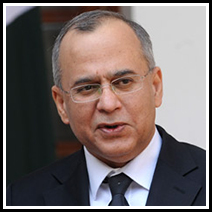Second Opinion
A Deal Too Far?
Date: September 19, 2019
After months of speculation about an impending peace deal between the US and the Taliban, the failure of the Trump administration to clinch a hard fought negotiated settlement has thrown Afghanistan and the region into greater uncertainty. As the we grapple with what this means for Kabul and the wider region, we collate analytical views by four leading voices on South Asia on what to expect in the coming months.
Sherry Rehman, Senator and President Jinnah Institute

President Trump’s decision to dead-end the reconciliation process after a painstakingly slow creep to a draft withdrawal agreement will precipitate an intensification of the war next door. For the Taliban, there is little to lose from failed talks. After gaining significantly on the ground, the lack of a deal will incentivise further attacks as the Taliban ramp up operations to disrupt the upcoming presidential elections. The possibilities that could have emerged from an intra-Afghan dialogue too will be a casualty of indecision in Washington and the rising death toll from a protracted conflict. The requirement of a ceasefire to proceed with talks too seems a difficult ask. With the Taliban determined to scuttle the democratic project and demonstrate their influence, reaching a ceasefire before elections is looking increasingly impossible.
For Pakistan, which has invested significant political capital in facilitating the talks in Doha, America’s withdrawal has complicated an already fragile regional situation. With tensions ratcheting up with India, and Iran in the throes of a wider conflagration, any expansion of the conflict in Afghanistan will have spillover effects. Foremost, Taliban offensives are likely to vitiate the Kabul-Islamabad dynamic as accusations against Pakistan by presidential hopefuls will make headlines in the west.
Meanwhile, Daesh will gain greater space to operate along the eastern provinces of Afghanistan bordering Pakistan. The reemergence of Daesh as a significant threat in the region poses serious security challenges for Pakistan. US pronouncements of a shock and awe strategy against the Taliban too will result in fissures in Islamabad’s careful recalibration of relations with Washington. What is clear is that the US and Afghan security forces will not be able to achieve military outcomes that they failed to achieve earlier with a significant troop surge. The only out in the conflict next door remains talks. Realigning US and Taliban incentives towards reconciliation should remain the focus of Pakistan’s engagement in the coming months.
Salman Bashir, Former Foreign Secretary

Talks between the US and Afghan Taliban in Doha lasted almost a year. The US Special Envoy, Zalmay Khalilzad, succeeded in negotiating a framework agreement that would have enabled a phased withdrawal of US troops from Afghanistan. In return, the Taliban would pledge to disassociate from terrorist organizations such as Al Qaeda and not attack US troops. It was also agreed that the Taliban would participate in an intra Afghan dialogue to be accompanied by a general cessation of hostilities. President Donald Trump considered this development as meriting signing at Camp David. Its last minute cancellation remains a mystery.
This year long reconciliation process had been driven largely by the political inclination of President Trump to end US engagement in an unwinnable war in Afghanistan. As he has indicated before, he could still act unilaterally to bomb his way out of Afghanistan. But with elections coming up in 2020 and a campaign promise on hold, Trump’s political inclination probably remains unchanged. The issue in finalizing an agreement remains the mode of withdrawal for US troops. However, America’s permanent ‘establishment’ does not have any such political compulsions. A bad deal was clearly unacceptable after so much investment in blood and treasure. John Bolton fiercely opposed the Camp David idea and the draft worked on by Zalmay. He was then fired by Trump from the post of National Security Adviser. There is little doubt that the envisaged deal would not have contributed substantially to durable peace in Afghanistan. By opting to engage directly with the Talban the US had recognized them as the principal Afghan party. Camp David would have given the Taliban an even higher degree of respectability. And while the deal may not have been ideal, President Trump seems to have over reacted by declaring the peace process ‘dead’.
Realistically, facts on the ground in Afghanistan matter. Eventually the US will have to withdraw its forces. Their best bet was to do so under an agreement with the Taliban. The other option is to reengage in a broader peace agreement which caters to the sensibilities of all Afghans and takes into account the requirements for maintenance of Afghan state institutions as well as the Afghan economy. The intra Afghan process is unlikely to take off now as President Ghani heads towards reelection on 28 September in worsening security conditions. This hiatus in peace efforts may prove to be costly for all sides. For Pakistan and the region, there are few options but to wait and see. President Trump has all the cards and should allow Khalilzad to have another try in hammering out a more acceptable deal.
Zahid Hussain, Author and Columnist

President Donald Trump’s abrupt upending of peace talks with the Taliban has intensified fighting in Afghanistan. While calling off the talks that had come very close to a deal the US president has indicated he would still withdraw US troops from the war torn country. He has asked the Kabul government to get ready to take the security responsibility.
The collapse of the Afghan peace talks has diminished the hope of ending the longest war the US has ever fought. Both sides have stepped up fighting. Taliban has vowed to disrupt the presidential elections to be held at the end of September. Dozens of people have been killed in the latest wave of violence. The US has claimed to have killed scores of fighters in intense bombing on Taliban strongholds.
Unsurprisingly, the Kabul government, which had been completely sidelined from the process has welcomed the end of the peace talks. President Ghani had insisted that peace could only be achieved through direct talks between an elected Afghan government and the Taliban. But the Taliban has refused to talk to the Ghani government. For many Afghans the prospect of the return to Taliban rule, however exaggerated, was disconcerting. Intriguingly, the Taliban had not defined their political agenda, adding to a sense of confusion.
With the end of the peace talks and escalation in fighting there is a danger of the neighboring and surrounding countries getting more deeply involved in the Afghan conflict. For the past few years the Taliban have earned greater international legitimacy. Russia and Iran have also been providing financial and material support to the insurgent group. Moscow has hosted several intra Afghan talks. Interestingly, Taliban sent a delegation to Moscow immediately after Trump announced an end to the peace talks.
Pakistan had played a critical role in facilitating the US-Taliban talks. This had also helped improving relations between Islamabad and Washington. The end of talks and intensification of fighting in Afghanistan will compound Pakistan’s predicament. There is likely to be greater US pressure on Pakistan to take action against the Taliban factions having sanctuary along the Pak-Afghan border.
Taliban leadership is still open to resuming the dialogue, but there is no indication yet that Trump would be willing to go back to the negotiating table soon. If Trump keeps to his promise of withdrawing US troops without a peace deal with the Taliban, he is likely to plunge Afghanistan in greater turmoil.
Madiha Afzal, Fellow The Brookings Institution

One has to feel for the many hours logged by Zalmay Khalilzad in negotiating with the Taliban, to get so close to a deal, only to have it pronounced “dead” by President Trump just before it was inked. The deal, far from perfect, is as good as it can get – Khalilzad has told us. And though it was far from certain that it would ultimately hold if a phase two deal between the Taliban and the Afghan government didn’t go through, it was good political cover for a president who wants American troops out of Afghanistan and who prides himself on being a dealmaker (and who, in his competition with Obama, dreams of a Nobel peace prize).
That still holds. Ultimately Trump (and his ego) could not stand the Taliban’s hesitation at his offer to come to Camp David to ink the deal, and he called it off. But this is likely temporary, and Trump will probably task Khalilzad go back to it within the next few weeks or months, ahead of the 2020 election. His Secretary of State wants the same thing.
The mood in America is dark when it comes to Afghanistan. The realization is that while America may not have technically lost this “longest” war, it can never win it. No one wants American troops to stay in Afghanistan, least of all Democrats. So, looking ahead to 2020, the next president – either a Democrat or Trump – will march toward a US withdrawal. The only question is whether they want it with a deal (as Trump does) or without (as some Democrats have suggested).
The latter is bad news for Pakistan. The fundamental problem of negotiating with a terrorist group aside, a Taliban deal is more useful to Pakistan than not. Pakistan is useful to America if it can help negotiate with the Taliban, and for Pakistan, neither an Afghanistan descended into civil war between its democratic government and the Taliban, nor one with the Ghani government firmly in control (and friendly with India), looks good. As hard a pill to swallow as it may be for those of us who hate the thought of the Taliban, Pakistan’s usefulness, and for now its government’s interest, centers around a successful U.S. deal with the Taliban.
